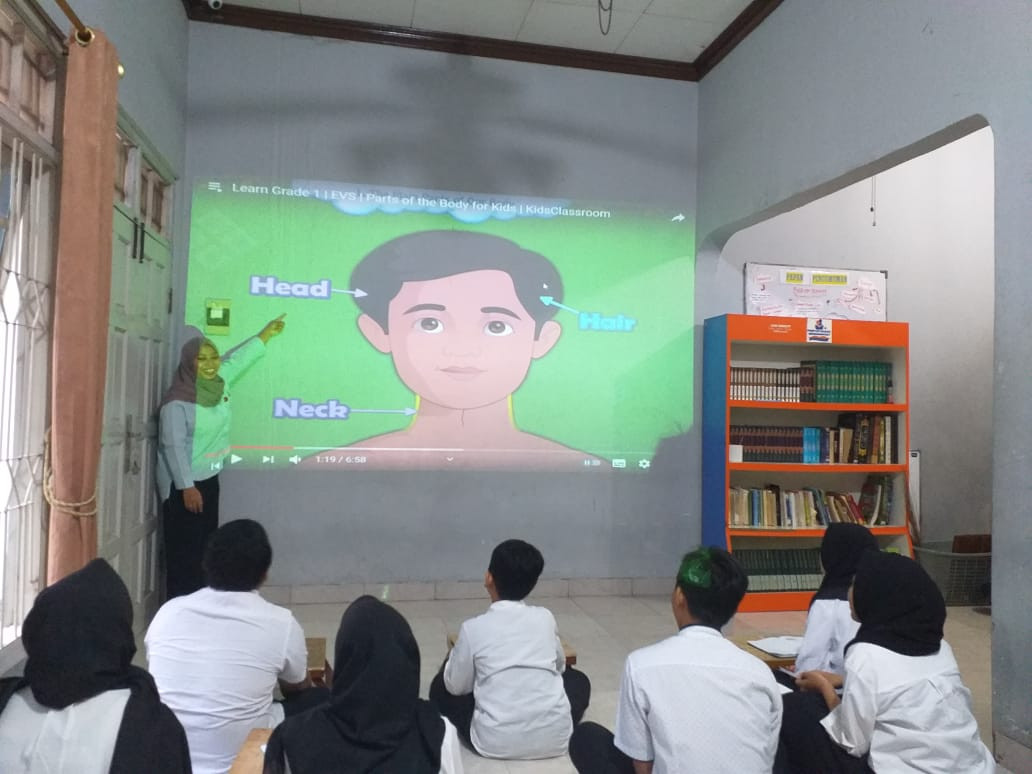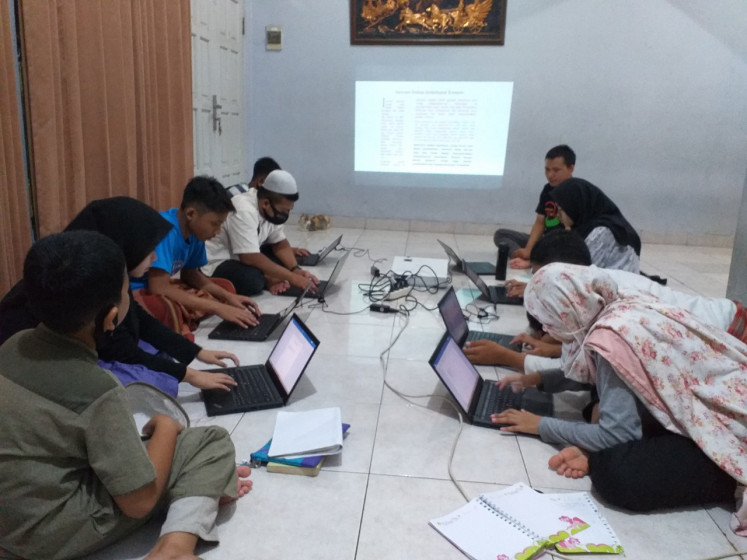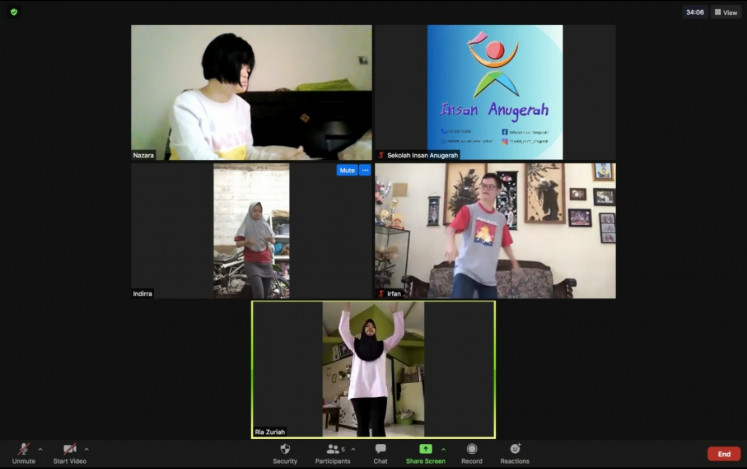Class struggles: How online schooling magnifies Indonesia’s social disparities
Even the best online education matters little if students can barely afford to log on.
Change Size
 Barely surviving: Nara Kreatif has 1,200 children attending day school and houses 10 boys and 8 girls in dormitories. (JP/Courtesy of Nara Kreatif)
Barely surviving: Nara Kreatif has 1,200 children attending day school and houses 10 boys and 8 girls in dormitories. (JP/Courtesy of Nara Kreatif)
O
nline education has exposed and, in many cases, widened the discrepancies between the educational experiences of children of different socioeconomic backgrounds.
Nadya Lumy is a rising 12th grader at Jakarta Intercultural School (JIS), and the past year has been a challenge for her. Like most teenagers, she misses being able to see her schoolmates in person and enjoy the human connection that screens cannot provide.
But Nadya’s frustration and sadness, while acute, is of a different character that that of underprivileged teenagers such as Rahmi, a 15-year-old student at Nara Kreatif, who barely has the means to attend virtual classes, let alone chat with her friends online.
Read also: Pandemic exposes private school vulnerability
Rahmi is lucky enough to have her education provided for by Nara Kreatif, a social enterprise that funds the education of children who live on the street through the sale of recycled materials, such as paper and organic waste. But the gap between the quality of her education and those who have easier access to it shows the kinds of challenges Indonesia’s underprivileged children face in the effort to improve their lives.
Worlds apart
The mental toll notwithstanding, Nadya has not experienced many technical frustrations with online schooling. JIS loans MacBook laptops to students for use throughout the year and also provides students with other resources, such as subscriptions to The New York Times and The Economist, to keep them up to date on current events.
Nadya doesn’t take these things for granted. She knows that the provisions have helped her significantly during this period of online learning.
“The MacBook from JIS is much faster [than my personal laptop] and has more memory. It has helped me do assignments, research, tests and all my other tasks easily.”
Few other educational institutions in the country share these types of resources. Nara Kreatif, for example, has 1,200 children attending day school, houses 10 boys and 8 girls in dormitories and does not have enough laptops to go around.

Muhammad Taufik, Nara Kreatif’s head of school dormitories, said, “The children will crowd around a single laptop in groups of four or five. We realize that this is not conducive [to their learning].”
As Indonesia continues to break daily COVID-19 case records, it does not seem that students will be returning to in-person learning anytime soon. Within the realm of online learning, students from less privileged socioeconomic backgrounds are at a disadvantage because of their lack of access to technology and internet services.
Rain or shine
“Having things online is sort of easier. I can get out of bed five minutes before class and simply take out my laptop,” said Nadya.
This is not the case for Maya Revika Sari, a sixth-grader at an elementary school in rural Lampung. Every school day is shrouded in uncertainty. In her village, wifi is inaccessable, so she and her classmates rely on mobile data. Consequently, she must plan her study schedule and location around an array of constraints.
From January to April, Maya’s village endures a harsh rainy season. For a few weeks, it rains nearly every day. Even a little drizzle can spell bad luck for Maya if she has an assignment due that day because of the poor cellular service that accompanies rain in the area.
“My teacher usually sends out assignments by 9 a.m., but on rainy days, I never know what time I’ll receive it,” she said. “At times, my friends will text me asking if I have finished an assignment, and I find myself frequently [in a position] where I haven’t even received it.”
Maya’s internet connectivity also fluctuates depending on her location.
On luckier days, her room has the best connection. On less fortunate days, it is her kitchen. On the worst days, she has to visit a classmate or relative to do her assignments.
“In the end, I have to move places. There are days when I go to my aunt’s house. If that doesn’t work, I go to my friend’s house. [In those cases], individual work becomes group work because I have to look at the assignment on my friend’s phone and do it from there,” Maya said.
‘It gets on your nerves’
With the constant unpredictability of mobile service in the village, the patience of students and parents alike has worn thin.
Aulia is a fourth grader who attends the same elementary school as Maya and lives in the same village.
“She’s a math genius – the girl doesn't even need to count on her fingers and she can immediately figure out the number!” exclaimed Aulia’s mother Nia, beaming with pride.
Aulia had been at the top of her class since the first grade, never failing to take home the yearly top student award. But this year, she had bad news for her mother when she came home from the school awards ceremony.
“Mom, I only got third place. [It makes me feel] so lazy!” she said.
Nia describes Aulia as very intelligent but prone to giving up. Aulia admits that the poor mobile connectivity has agitated her immensely.
“I like to complain to my mom that if this is how school is, I just have absolutely no will to go on,” Aulia said. “Then my mom will reply saying, ‘You can’t be like that, Auli. You’re smart, you know.’”
When her connection is unsalvageable, Aulia reads textbooks on her own. On top of her daily school tasks, the 9-year-old has taken on an ambitious workload.
“Sometimes, my dad likes to tease me and take pictures when I fall asleep on my books,” Aulia said with a chuckle. “The truth is, I’m just trying to study without having to [rely on] my teachers and the bad internet. The books are all I’ve got these days.”
Read also: Parents struggling to keep kids focused during online learning
The government has tried a variety of programs to even the playing field. The Education, Culture, Research and Technology Ministry has been broadcasting an educational TV program called Belajar dari Rumah (Learning from Home) on TVRI that airs on school days and is aimed at students from preschool to high school.

To assess the effectiveness of the program, UNICEF has helped educational authorities conduct regular surveys of teachers, parents and children from areas with little to no internet access and collect feedback on home learning.
UNICEF is also helping the ministry develop offline learning materials and establish guidelines for preventing and responding to COVID-19 in the education sector at the provincial and district levels.
Institutional strain
Pandemic-related financial burdens have not just impacted students. Many educational institutions themselves are barely surviving. A number of schools have been struggling to keep attendance and enrollment rates up, and the attrition has impacted school funding. The cycle is unlikely to end soon. Without students, institutions cannot afford to offer the level of education they aspire to, which in turn makes them less attractive to prospective students.
Muhammad Taufik of Nara Kreatif said, “During the pandemic, companies are initiating work-from-home (WFH) policies, so there isn’t any paper waste to be donated to us.” Without corporate paper contributions, Nara Kreatif has seen a sharp decline in its main source of income: recycling paper waste into items such as office supplies and calendars for profit.
They have had to give up one of their dormitories as a result, and the boys who once lived there were moved to the second floor of the Nara Kreatif office. To pay the wifi bill of Rp 500,000 (US$34) per month, a few volunteer teachers have taken funds out of their independent incomes to alleviate the financial stress. Nonetheless, the flow of donations has been unstable and inconsistent.
Read also: Indonesia's special needs children struggle for proper online education
Junika Sugiarsih, the founder and principal of Insan Anugerah, a school in Depok for children with Down syndrome, said the switch to online learning had caused many parents to take their children out of the school.
“Our students decreased from 16 to eight, and two of the eight are not capable of attending online classes. There are also students who simply refuse to sit in front of electronic devices.”
The Candradimuka Special Needs School is a school for autistic children in Cilandak, Jakarta. Imam Fauzi, its founder and principal, said student enrollment had decreased to 15 after the transition to online education.
Nevertheless, Muhammad of Nara Kreatif has a clear vision of what school administrators should be doing during the pandemic.
[gal:4]
“Our task here is to make sure their spirits do not deflate. Since starting online school, our role has been tremendous: educating them so that they are protected and safe, no matter the situation.”









